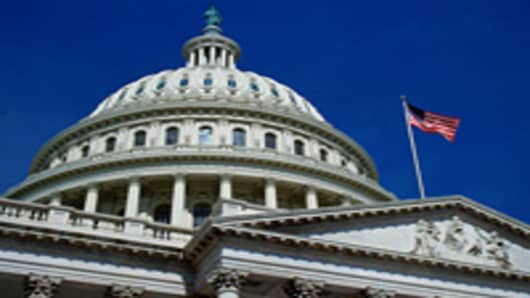The US government is careening towards a shutdown as Democrats and Republicans can't agree on a 2011 budget plan.
I believe a shutdown will occur.
For the first time since 1973, the Congress didn't pass a budget or spending laws for FY 2011 which began last fall. Since then, Congress has been passing a series of continuing resolutions (CR) to fund the government on a short term basis. The last CR ends tomorrow.
Remember, the President begins the process by proposing a broad outline for the budget with spending and revenue levels. Then, the US House of Representatives is charged with creating the actual planned budget and the Senate must follow by agreeing to the plan. If not, they have to negotiate a compromise and then send it to the president. So far, there is a gap of between $30-40 billion in discretionary spending cuts that separate the two sides. This is less than 1% of President Obama's $3.7 trillion in spending he had originally asked for when the entire process began.
Given the ridiculously small amount of dollars involved, why is this ongoing? The US budget deficit is projected to be $1.650 trillion in FY 2011 and the long term prospect for government spending is truly catastrophic. At current spending levels, the US spends about $200 billion a year for interest payments on the debt and is projected to spend $500 billion a year by 2015. By 2020, the amount is expected to rise to $1 trillion. Currently, the US government borrows 40c of every $1 it spends.
With this in mind, the 2010 Midterm elections in the US were driven by the emergence of a group that wants to end this cycle of mega deficits. The Tea Party was instrumental in electing candidates that promised to end the spending and pledged not to raise the debt ceiling until something was done. There are 87 freshman Republican House of Representative members that took the pledge and were elected based on this.
This group is driving the negotiating process on the budget deficit and believes that they were elected by the voters to do so. They are not likely to compromise easily because they know that they will have to answer to the will of the people should they not fulfill their pledge. Given that, it should not be a surprise that they want the additional spending cuts for 2011 before any discussions begin for 2012. The interesting aspect is that this group doesn't care about taking back the Senate or the White House in 2012. They want cuts now.
Therefore, I believe that the US government will be shut down as there won't be an initial compromise. How long it lasts depends on the conditions they extract for reducing the bigger game of entitlement spending. Also, the 2011 is truly just a prelim to hash out positions before the US government must raise the debt ceiling on May 16th.
The best news is that Rep. Ryan's 2012 budget proposal is the serious, adult budget unvarnished with gimmicks that will drive the discussions. This is the blueprint for the path forward for the country and shows true merit in addressing the long term fiscal problems. Like the UK budget, it also has serious components for growth that will keep the economy moving forward as the public sector is cut back.
Here's my timeline for this process. The lack of agreement on 2011 budget will shut down government for a short period of time, but could be as long as a month. The debt ceiling fight will last longer and perhaps all the way until July 4th. Then, there will be additional compromise and it the hike will be passed. Ultimately, the negotiations will delineate the positions of the two parties and drive elections for 2012. In turn, the outcome will decide the fate of the Ryan budget plan and the outlook for the United States over the next five to ten years.
Andrew B. BuschDirector, Global Currency and Public Policy Strategist at BMO Capital Markets, a recognized expert on the world financial markets and how these markets are impacted by political events, and a contributor to CNBC's Money in Motion Currency Trading.You can comment on his piece and reach him hereand you can follow him on Twitter at http://twitter.com/abusch.
Tune In: Beginning March 11th, CNBC's "Money in Motion Currency Trading" will air on Fridays at 5:30pm.
"Money in Motion Currency Trading" will repeat on Saturdays at 7pm.



